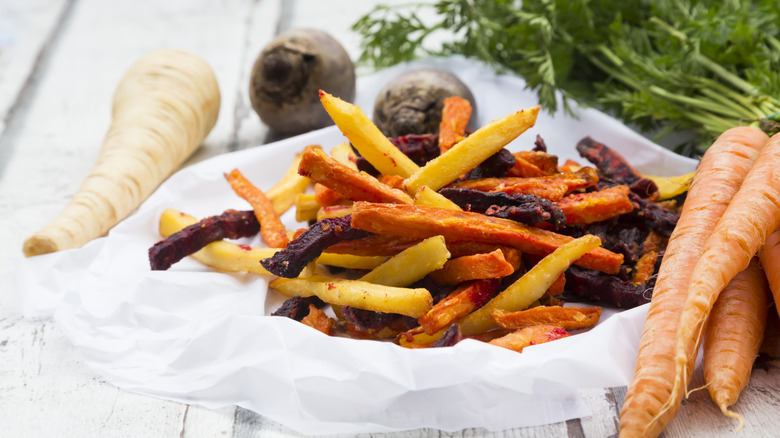The Vegetable To Add To Your Daily Diet For Smoother Poops
Let's face it — some days your bathroom routine just doesn't go as planned. Maybe you feel like you need to poop, but nothing's happening. Or you're stressed out about a work presentation and everything feels rushed, including your digestion. Sure, you could reach for a laxative, but the unpredictability of when it might kick in? That's a gamble most of us don't want to take.
There are some genius ways to help you poop almost instantly, but you can turn to parsnips to balance your digestive system and maintain regularity. These pale cousins of carrots don't get nearly enough credit, considering they pack almost twice the fiber per cup. That insoluble fiber bulks up your stool and helps keep everything moving smoothly, while the soluble fiber slows digestion just enough to support better blood sugar and cholesterol levels. Plus, parsnips are full of gut-friendly nutrients that support your microbiome and overall digestive health.
The health benefits of parsnips
Stress, changes in your routine, not drinking enough water, and eating too little fiber can all make your poop dry and hard to pass. One cup of parsnips packs about 6.5 grams of fiber, which can help you reach the recommended 25 to 30 grams of fiber you need to eat every day. Plus, parsnips come in at just 100 calories and are a good source of potassium, magnesium, vitamin C, and B vitamins.
Parsnips might also support your metabolic health, according to a 2025 study in NPJ Science of Food. They're loaded with fiber, furanocoumarins, polysaccharides, and organic acids that may work together to protect your body from diet-related conditions like obesity, high cholesterol, and high blood sugar. In the study, researchers made an extract from parsnips and gave it to mice on a high-fat diet. The extract helped control their weight, cholesterol, and blood sugar, while also strengthening the gut. It even boosted healthy gut bacteria and reduced harmful ones.
And that's not all. A 2021 review in the Journal of Pharmacopuncture found that compounds in parsnips may offer even more health perks. Some protect the brain from oxidative stress and support learning and memory. Others have antidepressant and calming effects that might benefit mental health. Parsnips also contain nutrients that may encourage hair growth and help treat skin issues like psoriasis. Plus, furanocoumarins in parsnips can slow cancer cell growth and may help lower blood pressure.
How to add parsnips to your diet
Parsnips are more versatile than you'd expect. You can use them as a swap for carrots in some of your go-to recipes to sneak in extra fiber. Making carrot cake? Try replacing some of the carrots with parsnips for a little twist. Not in the mood to cook? Blend up a parsnip smoothie. Just toss a parsnip in the blender with dates, coconut milk, yogurt, and almond butter. You can spice it up with flavors like cinnamon, nutmeg, vanilla, or shredded coconut.
If you're avoiding potatoes, parsnips are a great stand-in. Steam them for about 15 minutes to soften, then mash them like you would regular potatoes. Mix in some butter and milk, and you've got a creamy, fiber-packed alternative.
Parsnips also make great fries. Slice them thin, and toss with olive oil, salt, pepper, and maybe a sprinkle of Parmesan. Roast at 400 degrees Fahrenheit until crispy. An air fryer makes even crispier parsnip fries: Place them in an air fryer basket and set your air fryer at about 375 degrees Fahrenheit for 15 minutes.


